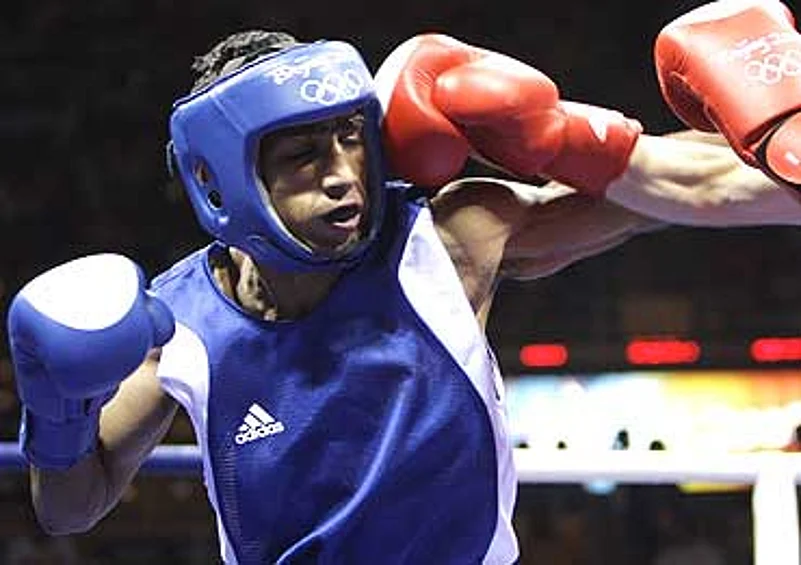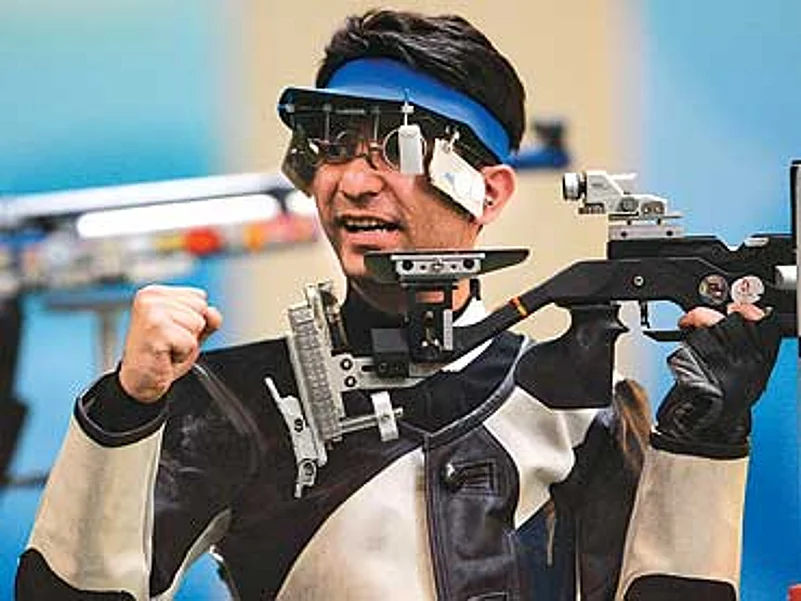The flight back from Beijing to Delhi has a fair sprinkling of Indians-- some Games-watchers, some tourists and some transient travellers through India to other parts of Asia. "It's a shame, isn't it?" Daljit Dhillon, who runs a business in Canada and is on his way to Amritsar, says. "Such a massive country, with nearly as many people as there are in China, and yet only three medals!"
Some truth there, for China won 51 gold among a total of a hundred medals; India's haul was just three, with one gold.
Yet, Beijing 2008 has given birth to hope -- there's reason to not despair. Our best Olympics stories-- Henry Rebello, Milkha Singh, PT Usha et al -- are no longer hard-luck tales that end in misery. We finally have winners, and expectations are high of a sporting revolution.
Advertisement
Abhinav Bindra won gold in 10 metre air rifle. Vijender Kumar won bronze in 75kg boxing, as did Sushil Kumar in 66kg freestyle wrestling. Three medals in one Games, making it India's most successful Olympics ever.
India's lack of "killer's instinct" has become part of sporting folklore, yet we won the three medals in martial sports-- shooting, wrestling and boxing. Shooting requires an iron will and a perfect physical condition; wrestling and boxing require great physical strength, ability to soak in pain, great skills and mental strength. Medals in these events prove that we do have the mental and physical strength to excel at the highest level.
Advertisement
Then, the span of our Olympics opportunities was widened as never before. In the past, only hockey was a reason for recurring hope-- the others went, it seemed, merely to make up numbers and live up to the other sporting ideal of honourable participation.

Saina Nehwal, the badminton prodigy, was just a few points away from reaching the semifinals. She breezed through to the pre-quarterfinals, where she faced China's Wang Chen, the world No. 6 and the fourth seed at Beijing. The Hyderabad teen, playing before a partisan home crowd, was undaunted-- she won 21-19, 11-21, 21-11 in less than an hour.
'I had no expectations… Getting into the Olympic quarterfinal is something I would have never dreamt of earlier," Saina said. Clearly, she had exceeded her own expectations, and when she faced world No. 21 Maria Kristin Yulianti of Indonesia in the next match, and led 11-3 in the third game, she perhaps thought she had done it.
"I got impatient, I wanted to rush through the match. My mind was in a state of flux. I was thinking of the semifinal," Saina said after returning to India. "The game slipped so quickly from my hands, I could not even hear what GopiSir (India coach Gopi Chand) was telling me. I was blank. I should have heard him out."
Advertisement
The loss, the fleeting glimpse of an Olympics medal, has only toughened Saina's resolve. She's determined to beat Yulianti when they clash next, and also to get a medal at the London Olympics. "I know the people will expect me to win a medal in London 2012, and I will be better prepared for that," she said.
Before Beijing, in 60 years of participation, we had just one boxer who'd reached the quarterfinals in the Olympics-- Gurcharan Singh, who in a heartbreaking manner lost out on a medal at the Sydney Olympics in 2000. In Beijing, we had three quarterfinalists-- that's an achievement no one could have dreamt of as recently as four years ago. Five boxers had qualified for Beijing, another high. This proves that the revolution in boxing is real, it's not an aberration.
Advertisement
Vijender Kumar, hours after his defeat in the semifinals of the 75kg category, said he hoped to do better in London. "I tried my best, but I could not attack well and score points in the first round," he said. "Then, when I tried to get the points in the third round, it did not work out."
But, he said, India will likely win a gold and a few other medals from boxing in 2012. That, after Beijing, doesn't sound like an empty boast at all.

Vijender will be a prospect, but the bigger hope could be Jitender Kumar, the 51kg boxer. He's got a compact boxing style, is enthusiastic and, most importantly, very young. He idolises Akhil Kumar, the third quarterfinalist and the man who beat a world champion at the Beijing Games, and is willing to go to any length to win a medal at the Olympics.
Advertisement
The Indian boxing coaches, Cuba's B.I. Fernandez and Gurbax Singh Sandhu, believe the future is good for Indian boxing. "India always had the talent, now all the different bodies involved are working in a unified manner and that's helping the boxers perform at the highest level," Fernandez said in a chat withOutlook.
The boxing and wrestling squads were made up of men who -- through lack of adequate, 'proper' education and family circumstances-- were unable to share the aspirations of middle-class India. The boxers all come from modest, rural backgrounds. Sushil Kumar's father, says the diminutive wrestler, has fetched milk for at least 14 years early in the morning, without fail, to ensure that his son doesn't lack a proper diet. He did that because, perhaps, sporting excellence was the only way for his son to move above the inherited state of scarcity. Education provides that function for some; in its absence, entertainment and sport do the job, as seen in Indian boxing and wrestling.
Advertisement
There's every possibility that, from smalltown India, more people would come into boxing and wrestling after seeing the achievement of these men. That's actually happening already-- Vijender, for instance, was inspired by the loss of Gurcharan in the semifinals of the 2000 Olympics.

Apart from Bindra's gold, shooting was a disappointment, actually. India had a team of nine-- the biggest number for the country at the Olympics -- five of whom have been world champions. Gagan Narang was unlucky to miss the 10m air rifle final on the count-back after a 595 out of 600. All the others disappointed as well.
Advertisement
Though they're in the dusk of their outstanding careers, there were hopes that Leander Paes and Mahesh Bhupathi would finally come back home with an Olympics medal; they cruised through their first two matches but then ran into the rampant Swiss pair of Roger Federer and Stanislas Wawrinka in the quarterfinals.
It was interesting to note one factor behind India's success-- the Mittal Champions Trust, for which it was the first Olympic Games after it was set up. Bindra is supported by MCT, as are Saina and two of the three boxers who reached the semifinals. Physiotherapist Heath Matthews, the key factor in Indian boxing's best show at the Olympics, was hired by the MCT. In all, 14 Indian athletes out of a contingent of 56 were sponsored, supported or trained by theMCT.
Advertisement
MCT was launched by LN Mittal, the steel tycoon, in November 2005; the stated objective was to identify a certain number of athletes and make sure that they got world-class training and facilities. Mittal wanted to put India on the world's sporting map and ensure that we got a few medals at the London Olympics.
Amit Bhatia -- LN Mittal's son-in-law and the man powering the MCT -- told Outlook: "We've worked hard with the athletes, we've given them training and best support possible… They've proved that given the right kind of support, there's no reason Indians can't do well at the Olympics. We're certain that we'll win many more medals at the London Olympics."
Advertisement
Squash player Joshna Chinappa was the first sportsperson to be taken under its wing by the MCT. Now a total of 40 athletes-- from archery, athletics, badminton, boxing, sailing, shooting, squash and swimming-- are supported by the MCT. The focus, clearly, is on Olympics sports.
A senior source in the MCT said that following the heartening performance at Beijing, the scope of the operation is likely to be enlarged. "The number of sports disciplines we're supporting is likely to go up after consultations next month," the source said.
The Indian Olympic Association is also pleased with that India didn't return from Beijing empty-handed, though its president Suresh Kalmadi says we should not be complacent. He also says that the haul from Beijing could have been greater. "We have missed chances, we have five world champions in shooting but we got only one gold," he said. "But I am happy with that. At least this time the Olympics jinx is broken but three medals are not enough for a land of a billion people."
Advertisement
Before the Games began, the nation wasn't too hopeful -- a silver and a bronze, from shooting and boxing, was the most they expected. That too would have made it India's best Olympics. Bindra's gold, India's first in individual sport and the first in all after 1980, on the third day after the opening ceremony, raised hopes of a greater harvest.
In the end, we finished with three medals -- a paltry figure, but there's evidence that it's no flash in the pan. There's hope, real hope this time, that this figure would expand.




















